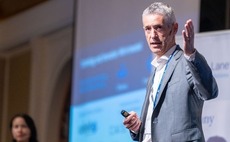
LP interview: Oregon State Treasury
Andy Hayes, PE investment officer at the Oregon State Treasury (OST), has been managing his fund’s Asian investments for nearly six years. The role is as much about networks as it is know-how
On a good run, the flight from Portland, Oregon to Hong Kong can take as long as 16 hours; factor in travel to and from the airport, delays and the inevitable jet lag and it can be a grueling ordeal. But to Andy Hayes, private equity investments officer at the Oregon State Treasury (OST), the trip is a necessary pain.
"You cannot just sit in North America and invest in Asia," he says. "You have to go there, to feel it, to touch it, to see it and get to know the people there."
Hayes is part of a three-man team that oversees OST's 23-year-old private equity program. Nearly all commitments to the asset class come via the Oregon Public Employee Retirement Fund (OPERF), which accounts for more than three quarters of OST's $87.4 billion in assets under management. The OPERF has $13.9 billion in private equity, around 21% of the total corpus.
With such a slim team, it is no surprise Hayes feels the program's success largely relies on the strength of its relationships.
Slow start
In Asia, those relationships date back to around to 1997 when OPERF committed $50 million to the HSBC Private Equity Fund II, at $52 million fund that generated a 1.53x money multiple and an IRR of 8.2%.
However, it wasn't until 2005 that OPERF began to focus on the region more, investing $100 million apiece in Asia Opportunity Fund II - managed by Chase Capital Partners (now Unitas Capital) - CVC Capital Partners Asia Pacific II. The former netted an IRR of 7.9% and a multiple of 1.71x, while the latter disappointed with a net IRR of -9.6% and a net multiple at 0.6x.
It was a difficult start, but Hayes explains that of the six dedicated Asia funds to receive commitments from OPERF between 2005 and 2008, four managed to outperform their vintage year. "That is how we benchmark our Asia investments - by looking at the opportunity cost of committing money to a fund in a particular vintage year against putting our money elsewhere," he says. "I think they have lived up to our expectations."
The global financial crisis led to a three-year hiatus in commitments to Asia. However, when OPERF did return in 2011 - first to invest $80 million in Baring Asia Private Equity Fund V, then a $50 million re-up for GGV Capital's fourth US- and China-focused fund - it was from a position of improved confidence.
"It has become less complicated to evaluate funds in Asia over the last few years and that is what prompted us to expand our regional portfolio," says Hayes. "The winners have begun to prove themselves, more GPs have started to return capital and we are seeing who can do this job in Asia."
Last year, this greater clarity saw OPERF break its habit of only investing in pan-regional or multi-country funds and make a first allocation to a single-country manager. A $75 million commitment was made to China-focused CDH Fund V, a $2.5 billion vehicle that reached a final close last month. Hayes warns not to expect a wave of similar investments.
"It was a toe-in-the-water test for a country-only mandate," he explains. "However, it is hard to single China out as just another country fund considering how massive China is."
In any case, managing GP relationships across several countries can be problematic for an LP with OPERF's resources. This reality has also informed the LP's approach to co-investment.
Unlike some North American LPs, OPERF does not have an in-house co-investment program but instead operates via a $1 billion joint vehicle with Washington State Investment Board. It is managed by boutique investment firm Fisher Lynch Capital, which mines the relationships within the LPs' portfolios for opportunities globally.
"The advantage of doing it in-house is that you get to know your GP on a different level, you get to walk through the deal with them," says Hayes. "But the benefit of having it externally is that Fisher Lynch can devote many more hours and resources, and be much more flexible."
He gives no indication that this approach to co-investment is likely to change. When it comes to Asia, however, OPERF has not ruled out the possibility of increasing its exposure. Indeed, last year the fund committed $425 million to Asian private equity, including a $200 million allocation the $6 billion KKR Asian Fund II - its largest contribution to a single Asian fund to date.
Relationship management
How OPERF's role in the region evolves will depend on how attractive Asia looks. For his part, Hayes is excited about tapping into region's continued macroeconomic growth, but inevitably the quality of its GP relationships that will decide its future success.
"That is a difficult part of being a North American LP investing in Asia, it's so far away," says Hayes. "What we have tried to do in the last six years is build our network of locals in Asia who know market well and whom we can rely on to help us understand things better."
He adds that much of the challenge lies in reconciling the expectations of North American LPs and Asian GPs, especially given the relative maturity and immaturity of their respective markets. For example, many LPs are looking for more reporting and transparency, but some Asian GPs have some way to go in this respect.
"Anything the GP can do to foster a partnership mentality with their LPs will go a long way," says Hayes. "LPs in North America do not have much time to spend over there, so we are essentially asking these GPs to help us fulfill our duties by being good stewards of our capital. On the flip side, it is on our shoulders to come to Asia as often as we can."
Latest News
Asian GPs slow implementation of ESG policies - survey
Asia-based private equity firms are assigning more dedicated resources to environment, social, and governance (ESG) programmes, but policy changes have slowed in the past 12 months, in part due to concerns raised internally and by LPs, according to a...
Singapore fintech start-up LXA gets $10m seed round
New Enterprise Associates (NEA) has led a USD 10m seed round for Singapore’s LXA, a financial technology start-up launched by a former Asia senior executive at The Blackstone Group.
India's InCred announces $60m round, claims unicorn status
Indian non-bank lender InCred Financial Services said it has received INR 5bn (USD 60m) at a valuation of at least USD 1bn from unnamed investors including “a global private equity fund.”
Insight leads $50m round for Australia's Roller
Insight Partners has led a USD 50m round for Australia’s Roller, a venue management software provider specializing in family fun parks.








